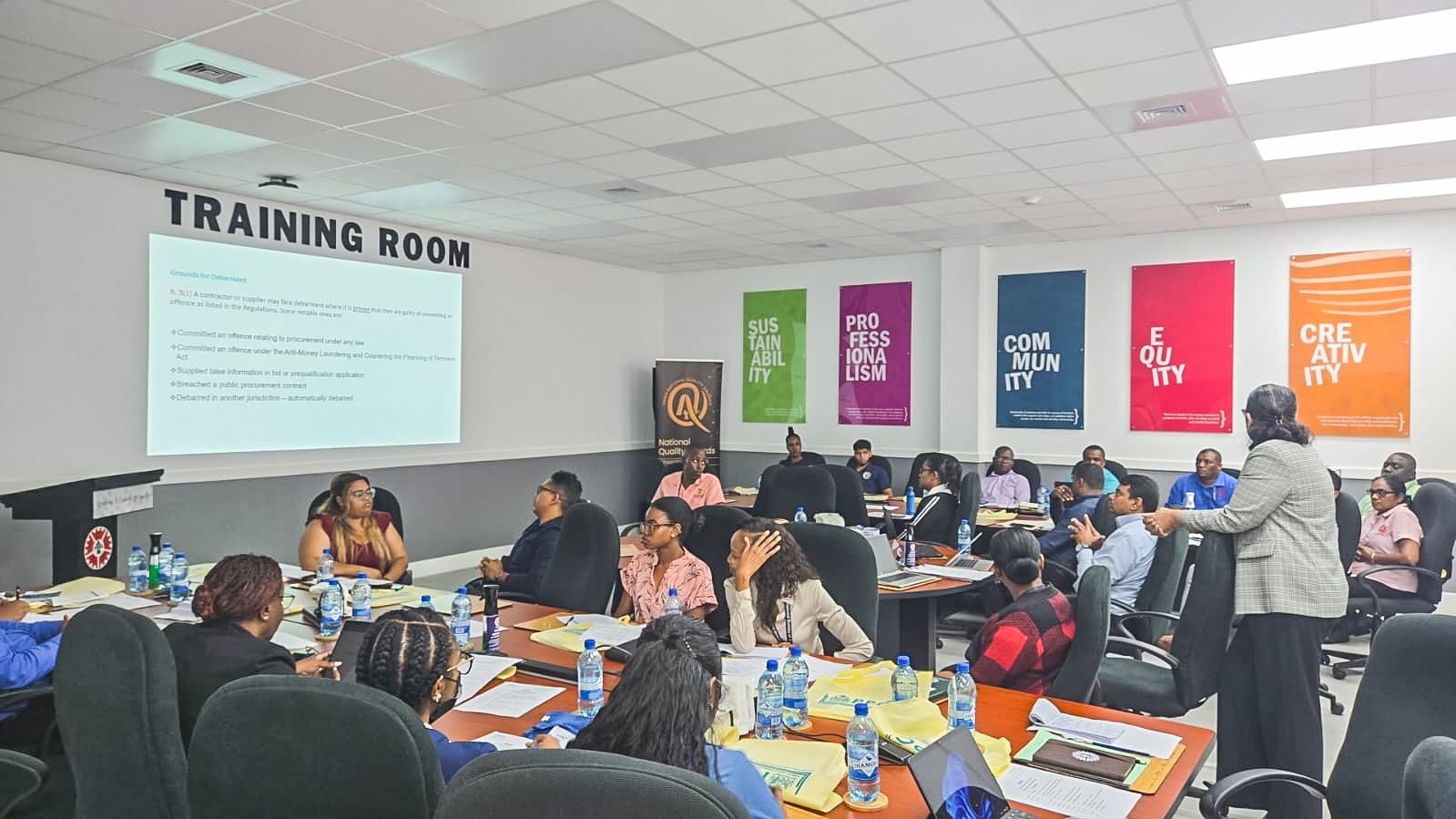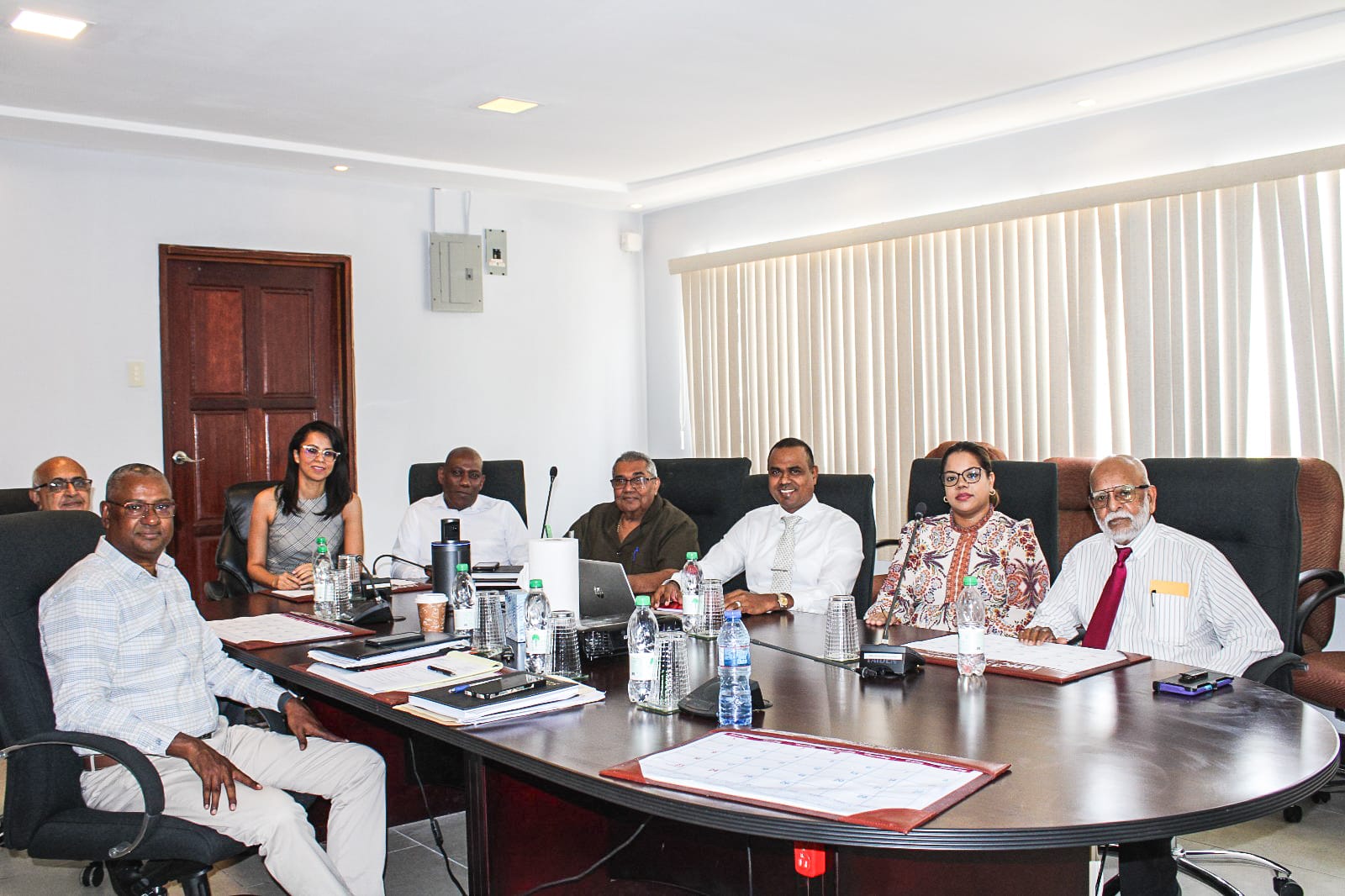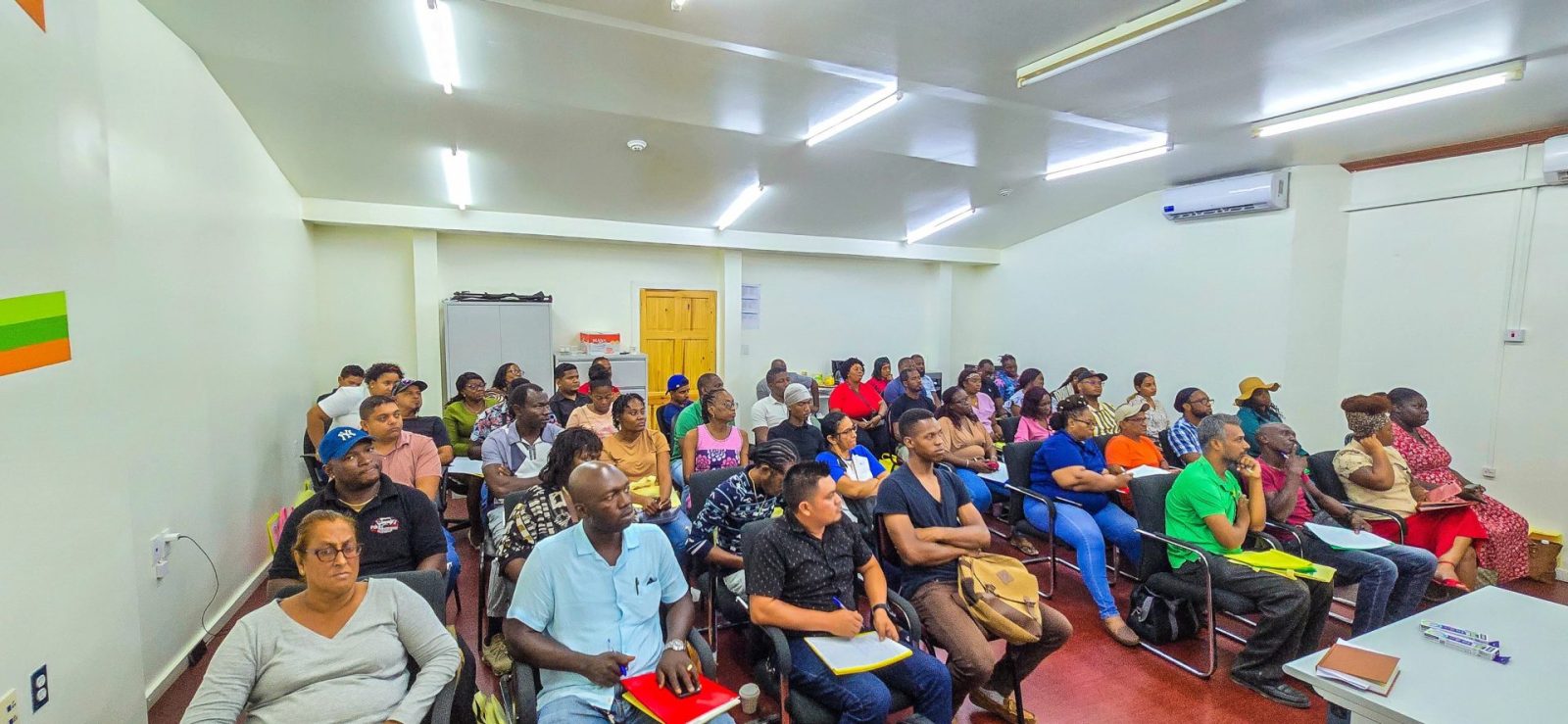Archives: Items
Circular No.03/2025-Thresholds for Various Procurement Methods
Brochure – Public Procurement Commission – Procurement Process
PPC Conducts Procurement Training for Public Entities
PPC Conducts Procurement Training for Public Entities

FOR IMMEDIATE RELEASE
April 16, 2025
PPC Conducts Procurement Training for Public Entities
Georgetown, Guyana – The Public Procurement Commission (PPC) (‘the Commission’) successfully hosted a Public Procurement Training session on April 15, 2025, at the Guyana National Bureau of Standards (GNBS) Training Room. The session brought together 24 participants from four public entities, namely, the Guyana National Bureau of Standards (GNBS), Ministry of Tourism, Industry and Commerce (MINTIC), Small Business Bureau (SBB) and Competition and Consumer Affairs Commission (CCAC).
This initiative highlights the national importance of improving public procurement practices impacting the efficiency and integrity of procurement operations across government agencies. The training equipped participants with the skills and knowledge necessary to strengthen institutional capacity and promote accountability and transparency in the public procurement process.
Participants included Heads of Departments, Directors, Administrative and Procurement Officers from the aforementioned institutions.
The training is part of PPC’s ongoing public awareness campaign aimed at bestowing stakeholders with the knowledge of public procurement rules and procedures. Through these efforts, the Commission continues to strengthen institutional capacity while promoting accountability and adherence to procurement regulations.
The session was facilitated by our team from the PPC comprising Ms. Bibi Shabena Ali, Head of Legal; Mr. Antonio Yhan, Training Officer; and Mr. Davindra Singh, Procurement Specialist.
Attendees were engaged in an in-depth curriculum covering key procurement areas such as:
- Legislative Framework
- Best Practices in Public Procurement
- The Procurement Cycle
- Tender Evaluation
- Contract Management
- Monitoring and Reporting in Procurement
The PPC is mandated by Article 212AA (1)(b) of the Constitution of the Co-operative Republic of Guyana, Cap. 1:01 to “promote awareness of the rules, procedures, and special requirements of the procurement process among suppliers, contractors, and public bodies.” Additionally, pursuant to Section 17(2)(c) of the Procurement Act, Cap. 75:03, the PPC is responsible for organizing training seminars on procurement-related matters.
The PPC remains steadfast in its commitment to building capacity and enhancing public procurement systems. Through these training initiatives, the Commission continues to support the development of a more robust, transparent, and accountable procurement environment within the public sector.
For more information or to schedule a training session, please contact the PPC at:
📞 (592) 226-3729 | (592) 231-7306 | (592) 226-2364
📧 Email: operations@ppc.org.gy
PPC and NPTAB Collaborate to Strengthen Procurement Processes
PPC and NPTAB Collaborate to Strengthen Procurement Processes

Members of the Public Procurement Commission (PPC) and the National Procurement and Tender Administration Board (NPTAB)
March 26, 2025 – Georgetown
Georgetown, Guyana – March 26, 2025: In a strategic move to enhance the public procurement process, the Public Procurement Commission (PPC) (‘the Commission’) hosted a pivotal meeting with the National Procurement and Tender Administration Board (NPTAB) at the Commission’s office located at New Garden Street, Queenstown, Georgetown.
Representing the PPC were Chairman Ms. Pauline Chase, Commissioner Mr. Rajnarine Singh (in person), Commissioner Mr. Joel Bhagwandin (virtually), and Chief Executive Officer Mr. Michael Singh. The NPTAB delegation included Chairman Dr. Tarachand Balgobin, Board Members Mr. Bernard Lord, Mr. Desmond Mohammed and Senior Procurement officer Ms. Amrita Latchman, along with Chief Executive Officer Mr. Arvind Parag. The Finance Secretary of the Ministry of Finance, Mr. Sukrishnalall Pasha, also participated virtually.
This high-level engagement facilitated an in-depth discussion on key issues impacting public procurement. In alignment with Act 212CC (1) of the Constitution of The Co-operative Republic of Guyana and enabled by S.17 (2)(d) of the Procurement Act, Cap. 73:05, the PPC is required to report to the Minister of Finance on the effectiveness of the procurement processes and recommend therein any amendments to the said Act which may be necessary to improve the effectiveness of the procurement process.
Chaired by PPC Chairman Ms. Pauline Chase, the meeting focused on the following agenda items:
- Standard Bidding Documents
- Standard Evaluation Report
- Training of Evaluators
- Update on E-Procurement
- Review of 2004 Procurement Documents
- NPTAB operations.
These discussions followed prior engagements of the parties and are part of a broader initiative to strengthen procurement systems, ensuring greater accountability and improved service delivery. The collaboration between the Public Procurement Commission and the NPTAB along with the Finance Secretary reinforces a commitment to advancing knowledge, fostering transparency, and strengthening procurement practices in Guyana. As the PPC continues its efforts to fulfill its constitutional mandate, it encourages stakeholders and engagement from relevant entities to collectively enhance the landscape of public procurement in the Co-operative Republic of Guyana.
For further information, please contact the Public Procurement Commission at (592) 226-3729, (592) 231-7306, or (592) 226-2364, or via email at publicprocurement@ppc.org.gy.
28 March
—End—
Setting the Record Straight: PPC Addresses Inaccuracies in Recent Reports on Procurement Investigation
Setting the Record Straight: PPC Addresses Inaccuracies in Recent Reports on Procurement Investigation
The Public Procurement Commission (PPC) (‘the Commission’) acknowledges and notes with interest the Stabroek News article titled “Moment of truth for Tepui project and NDIA,” dated March 10, 2025, followed in lockstep by a Kaieteur News’s editorial dated March 15, 2025, captioned “Public Procurement Commission”.
However, for the record, it is imperative to correct mischaracterizations, misrepresentations and misinformation therein of the PPC’s role and the timeline of its actions in the matter concerning the $865M pump station contract awarded to Tepui Inc.
PPC’s Mandate and Investigative Authority
First and foremost, the PPC’s constitutional mandate is enshrined in Article 212W of the Constitution of Guyana, which is an oversight responsibility to monitor that public procurement is carried out in a fair, equitable, transparent, competitive and cost-effective manner according to law. The Commission does not award contracts. It does not have executive authority to cancel contracts, nor does it act as an enforcement agency. One of the many functions of the Commission however is to investigate procurement processes, issue recommendations and remedial actions.
Timely Investigation and Public Disclosure
Contrary to claims of tardiness and being hesitant in addressing this particular matter, the PPC acted within its remit and in a timely manner:
- The Commission promptly initiated an investigation into the award of the contract after concerns were raised by the public and a formal request for an investigation (“the complaint”) was lodged on October 3rd, 2023, by an Opposition Member of Parliament. There was absolutely no hesitancy as the PPC’s investigative mechanism was engaged within seventy-two hours of receiving the complaint with a request being dispatched on October 6th, 2023, to the procuring entity and the subject tender board to answer the allegations of the complaint.
- Though there were delays in receiving responses, the PPC, in keeping with timelines for its investigations and bettering timelines of the prior constituted Commission, on April 16th, 2024, published its comprehensive and thorough 35-page Summary of Findings making thirteen recommendations, inter alia, that the subject procuring entity, to wit, the National Drainage and Irrigation Authority (NDIA) monitor the contractor’s performance and take appropriate action if breaches occurred. The matter was also referred to the Auditor General in accordance with Article 212AA(1)(l) of the constitution.
- The PPC maintaining its oversight responsibility, requested updates from the procuring entity. As disclosed by the Commission and reported in an Editorial of the Stabroek News of July 15, 2024, headlined, “Disrespect to the Public Procurement Commission”, the requested information was not forthcoming, and consequent steps were being taken to engage the subject Minister on the matter.
- Still receiving no updates, the PPC conducted a site visit on November 28, 2024, to assess the progress of the project and continued to follow up with procuring entity for submission of related project execution documents.
It is important to note that this site visit followed that of the Auditor General, on August 14th, 2024, as reported in the Auditor General’s 2024 Report.
A complete bundle of documents was submitted by the procuring entity to the Commission some two months later in January 2025, which then enabled a comprehensive fact-based assessment of the status of the works including the percentage of work completed in comparison to its projected status as at the date of the visit.
- The matter was considered by the Commission at a meeting in February 2025 and the procuring entity promptly thereafter engaged.
PPC’s Due Process and Procedural Integrity
The claim that the PPC delayed action for three months between its site visit and its formal correspondence to NDIA ignores not only the aforesaid facts, but the Commission’s duty to observe due process. The PPC must conduct thorough assessments, compile findings, and ensure that all recommendations align with legal procurement frameworks. Issuing public statements or recommendations on speculation without a complete and substantiated report would be premature and irresponsible.
Responsibility of the NDIA and Other Procurement Authorities
Both publications appear to incorrectly place the burden of enforcement solely on the PPC. The NDIA, as the procuring entity, has a direct responsibility to ensure that the contractor meets performance obligations. The National Procurement and Tender Administration Board (NPTAB) was responsible for the evaluation and approval of the award. The PPC, in keeping with its constitutional mandate, investigated the matter and made recommendations, but ultimate enforcement remains within the NDIA’s jurisdiction.
In the premises, it is improper to assert, as charged in the aforesaid publications, that there was hesitation or tardiness on the part of the PPC.
Further in the aforementioned Stabroek News article, the entity feigns ignorance stating that, “It is unclear why it took the PPC three months to write the NDIA on the findings of its visit on November 28th last year.”
This is an astonishing position since the publication had sought updates from the PPC and was responded to as recently as February 20th, 2025, wherein the PPC informed that:
“The Commission received the complete bundle of documents from National Drainage Irrigation Authority (NDIA) in January 2025 and conducted a site visit as part of its monitoring function. The matter was most recently considered at the Commission’s last meeting on Thursday. However, no public comments will be made at this time, as the procuring entity has not yet had the opportunity to be engaged.”
This was surreptitiously not disclosed.
It of course goes without saying that any matters which were “unclear” could have been clarified by seeking clarification from the PPC prior to print which would be expected within journalistic ethics.
Specifically, the Kaieteur News editorial displays reckless and utter disregard for accuracy preferring instead to peddle misinformation and wild irrational speculation. Inter alia-
- The statement that “it took the PPC 14 months from September 2023, the date of the contract award, to visit the Belle View Pump Station” does not take into account, inter alia, the site visit conducted by the PPC in March 2024 as part of its investigation and considered in the Summary of Findings published on the Commission’s website. It would therefore appear that the editorial was written thereon without even reading the same. Nor does it take into account any of the aforementioned considerations.
- The statement that the PPC has completed four investigations and issued two reports, without disclosing a source, was stated to be, admittedly not current. That is, from the period July 2022-December 2023. From a perusal of the Commission’s website, it could be easily ascertained that in fact to date, the Commission has issued seven (7) investigative reports from July 2022 to date, an Annual Report and a host of other publications and work in execution of the Commission’s thirteen (13) constitutionally enshrined functions.Further, had the publication engaged the Commission prior to print, it could also have been easily ascertained that to this date, there are no pending complaints before the Commission, all requests having been duly considered and acted upon accordingly.
- The publication further repeats its false narrative, prior published, of a purported increase in employment and other costs by comparing a period when the Commission was not constituted with a period when the Commission became constituted and thereby staffed. The Commission previously addressed this false narrative of Kaieteur News by way of Press Release dated December 4, 2024, which the publication did not carry or take cognizance of in its Editorial.
The PPC remains committed to upholding procurement integrity. The findings published in April 2024 served as an early warning for the NDIA to take action and further follow-ups reinforced the urgency of intervention.
The PPC in the premises categorically rejects any assertion that it has been hesitant or tardy in addressing the Tepui Inc matter. The Commission has acted within its constitutional framework, provided transparency through its published findings, and continues to monitor that procurement entities execute their responsibilities in the best interest of public funds. It is now incumbent upon the NDIA to act in accordance with procurement laws.
March 21, 2025
— THE END —
Brochure – Public Procurement Commission – Procurement Methods
Brochure – Public Procurement Commission – Threshold
Brochure – Public Procurement Commission – Procurement Plans
Public Procurement Commission and Small Business Bureau Conduct Public Procurement Training for Small Business Owners
PRESS RELEASE
Public Procurement Commission and Small Business Bureau Conduct Public Procurement Training for Small Business Owners

Photo: Attendees at the training exercise on public procurement held on March 18, 2025 at the Small Business Bureau in collaboration with the Public Procurement Commission
Georgetown, Guyana – The Public Procurement Commission (PPC), in collaboration with the Small Business Bureau (SBB) under the Ministry of Tourism, Industry and Commerce, successfully hosted a Public Procurement Training session at the Small Business Bureau on Tuesday, March 18, 2025.
This one-day training aimed to strengthen the capacity of small businesses to compete for government contracts. It was attended by 50 participants representing various sectors, including agriculture, construction, real estate, farming, logistics, fashion, catering, arts and crafts, and general services. The event marked a significant milestone in empowering small businesses .
As part of the PPC’s strategic efforts to promote fair access to government contracts, the training emphasized public awareness and procurement system navigation to maximize benefits for small businesses. Article 212AA (1)(b) of the Constitution mandates the Commission to “promote awareness of the rules, procedures, and special requirements of the procurement process among suppliers, contractors, and public bodies.”
The collaboration between the PPC and SBB has been instrumental in the success of this initiative. Together with the PPC’s aforementioned constitutional mandate, the training also aligns with the statutorily mandated Small Business Procurement Programme (SBPP), as outlined in Section 11 of the Small Business Act 2004. The SBPP requires that that the Government must “use its best endeavors to ensure that at least 20% of the procurement of goods and services required annually by the Government is obtained from small businesses.”
Mr. Mohammed Shazim Ibrahim, CEO of the Small Business Bureau, delivered opening remarks, emphasizing the importance of the training in contributing to the economic development of Guyana. He stated that-
“The Small Business Procurement Programme ensures that small businesses have fair access to these opportunities. We encourage all participants to engage, ask questions, and foster collaborations that will drive their success.”
He, clarified that while like the PPC, they do not award contracts, they provide critical opportunities for members to learn about procurement processes and available opportunities.
Following on, the PPC Training Officer also reiterated that the PPC does not award or revoke contracts. Instead, it is responsible for monitoring, investigations, legislative reform, and providing training on public procurement. After an evaluation is conducted, the appropriate board finalizes and awards the contract.
Ms. Raushell Underwood, Training Coordinator of the SBB, provided an overview of the Small Business Procurement Portal and the 20% Procurement Programme, highlighting the SBB’s role in supporting small businesses. A key segment of the training focused on navigating the procurement portal, including tender submissions and document uploads. This hands-on session equipped participants with practical skills to engage in government procurement processes.
The training was led by Attorney-at-Law Ms. Esther Osborne, Training Officer Antonio Yhan, and Civil Engineer Mr. Savion Paddy all of the PPC. Throughout the session, participants gained valuable insights into public procurement, including the role and responsibilities of the Public Procurement Commission, the legislative framework governing procurement, the debarment process, procurement methods used in Guyana, tender document preparation, tendering best practices, and the tender opening and evaluation process.
This training is expected to empower small businesses to participate actively in government procurement and leverage the 20% Procurement Programme. The Public Procurement Commission remains committed to supporting small businesses by equipping them with the necessary tools and knowledge to thrive in the competitive procurement landscape.
The PPC looks forward to future collaborations to further its mission of fostering transparency, accessibility, and efficiency in public procurement.
March 18, 2025
— END —
